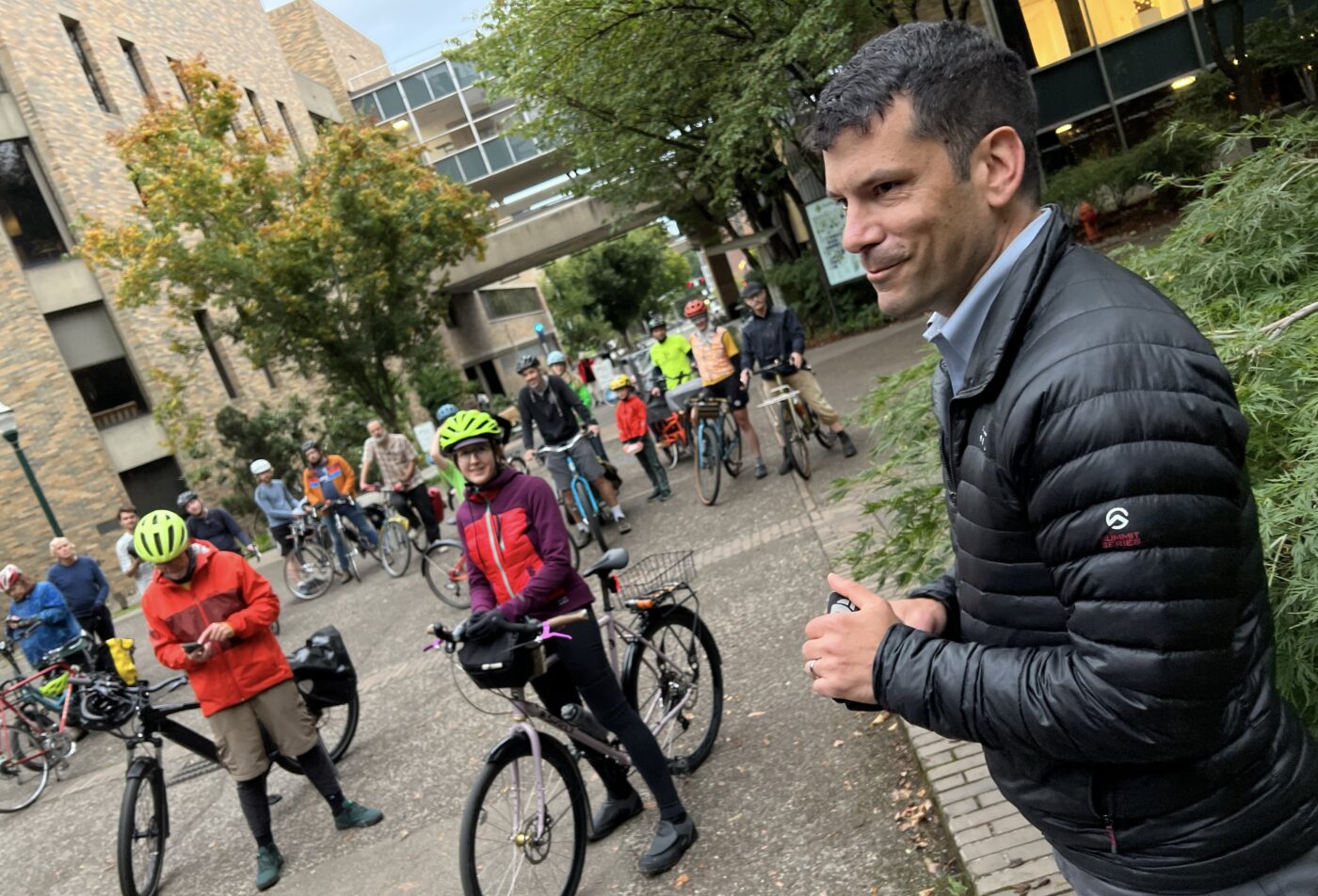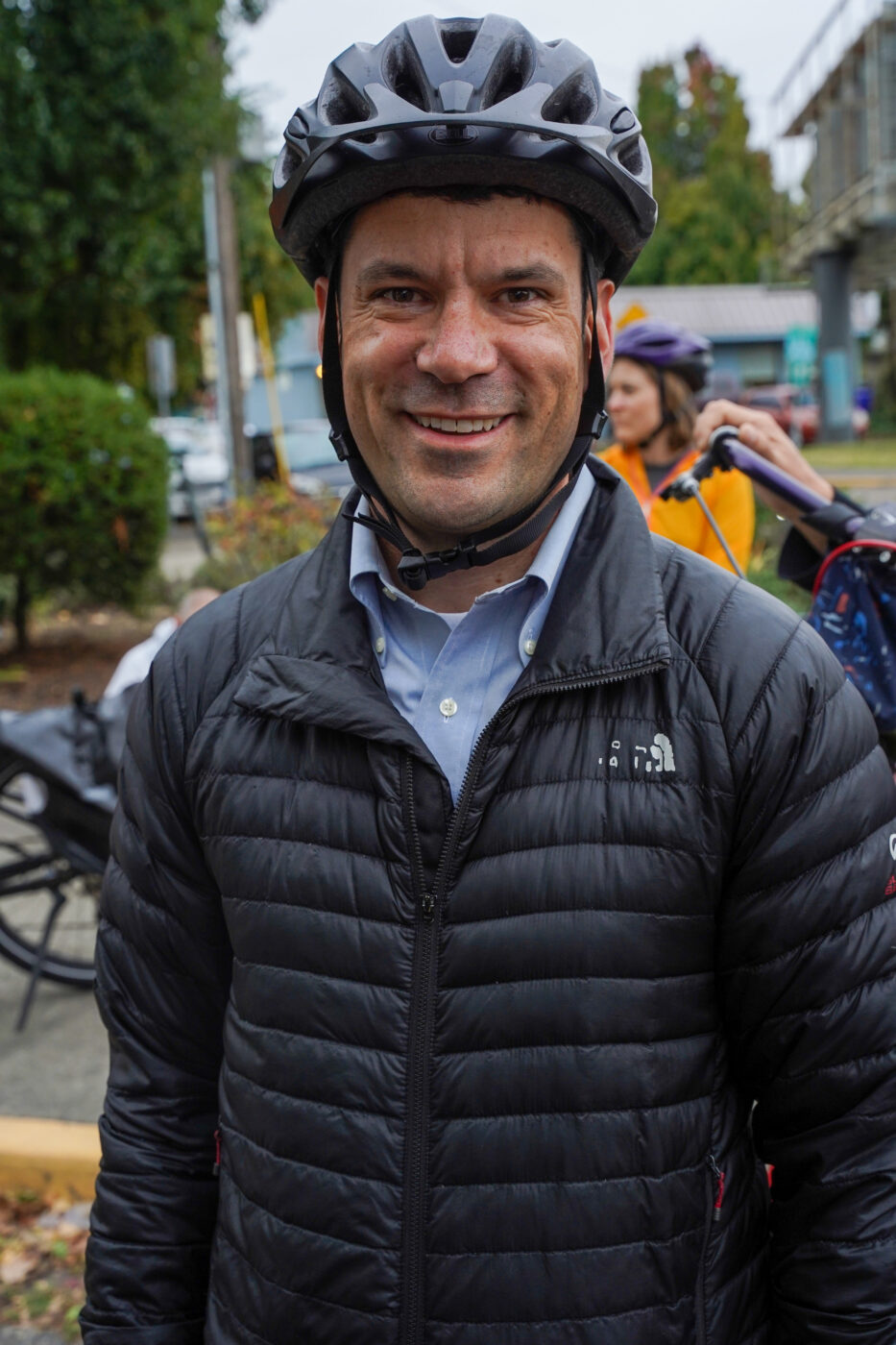
The new crop of city council candidates is looking really good from a transportation reform perspective. Keeping in mind that our current City Council is one of the weakest ever when it comes to understanding the vital role safe streets and transportation planning can have on the success of our city, the slate of about 20 or so candidates for 2024 is downright exciting.
A quick scan of the names reveals several that have been involved with bike activism and/or related policymaking. And we’ve already had four candidates show up and give speeches at BikePortland events! One candidate I’ve yet to meet, school teacher Tiffany Koyama Lane, told Willamette Week on Monday that having safe streets for people who walk and bike is a “basic right.”
But District 4 candidate Chad Lykins is on a whole other level.
“I will enact city policies that prevent special interests from rolling back improvements to transportation safety and carbon reduction.”
– Chad Lykins transportation policy platform
Most candidates don’t have platforms published on their websites yet, much less anything about transportation. But Lykins, founder of a small business that teaches young people how to play chess, has a detailed one. And he’s so confident about it, he messaged me last week to say: “We’re trying to build the strongest transportation platform of any city candidate. Can you have a look and tell me how we can improve it?” Then Lykins showed up to our Broadway bike ride on Friday and shared a bit about it in a short stump speech.
So I figured I’d take Lykins up on his offer. But instead of messaging him back, I thought it would be fun to post his platform here and have all of you weigh in on what he’s got so far.
Below is Lykins’ transportation platform (links are his):
The City of Portland’s Climate Emergency Workplan for 2022-2025 identifies transportation as responsible for 44% of carbon emissions in Multnomah County, the largest source of carbon of any sector.
The best way to reduce the carbon impact of transportation is by making it safer to walk, bike and take public transit. More than 60% of Portlanders say they would ride public transportation and more than 70% would ride bikes, ebikes, or scooters if doing so was safe and affordable. Portlanders are ready to commit to transportation if leaders will support them doing so safely. The Climate Emergency Plan adopted by the City sets clear priorities: “For more Portlanders to use climate-friendly travel options, our streets must prioritize people biking, walking and taking transit” (p. 8).
Though Portland Bureau of Transportation’s staff has been working toward “rapidly reducing the amount of driving in our community” (p. 6), those who lead PBOT have wasted public resources by attempting to spend money to remove infrastructure necessary both to public safety and to our climate goals.
Wasteful spending could not come at a worse time. PBOT is in a budget crisis that has worsened over several years. It has already lost 60 staff positions and is facing an additional $30 million in cuts. This is occurring against a backdrop of record numbers of traffic fatalities.
I will enact city policies that prevent special interests from rolling back improvements to transportation safety and carbon reduction. Specifically, I will propose legislation that prohibits the removal of infrastructure for pedestrians, cyclists, and public transit before (1) the completion of comparable alternatives and (2) validation that these alternatives function as well or better than the infrastructure being removed.
The underlying cause of PBOT’s budget crisis is dependence on fossil fuel consumption. PBOT is funded through gas taxes and downtown parking fees. Gas taxes are declining due to increased fuel efficiency, while downtown parking revenue is decreasing for a number of reasons.
Modest increases in hourly parking fees in highly congested areas can help reduce curbside crowding and increase revenue.
Entertainment districts provide another opportunity. These areas experience crowded curbs in the evenings, making it difficult to access nearby businesses. The city can help small businesses and generate substantial revenue by expanding time-limited parking in these designated areas from 7:00pm to 12:00am.
Portland must have a long-term plan for the way it funds transportation. As revenues derived from fossil fuel consumption dry up, PBOT will likely return to prior proposals for either a transportation utility fee or utility rate increases. I will make sure that any changes to our collective tax obligations do not place an undue burden on low-income residents or any other specific group.
What do you think? What would you change and what should it include if it really wants to be the “strongest”? If you were running for council, what key positions and policies would you be sure to include in your official platform?
Let the competition for the best transportation policy platform begin!



